Travis Luedke's Blog, page 14
February 12, 2014
Are New York Publishers Still Relevant? (REBLOG) #PubTalk #ASMSG
 Laugh at the
Indie Math
all you like, I'm laughing at the end of every month
Laugh at the
Indie Math
all you like, I'm laughing at the end of every month when Amazon's direct deposit comes in.
Just today I found this awesome article from Huffington Post, courtesy of Digital Book World's daily email. Though I tend to get angry at DBW for some of their ridiculously slanted editorial postings, I always read their emails. Occasionally they post a gem like this:
http://www.huffingtonpost.com/penny-c-sansevieri/are-new-york-publishers-s_b_4763640.html
Are New York Publishers Still Relevant?Posted: 02/10/2014 9:47 pm EST Updated: 02/11/2014 9:59 pm EST
For years New York publishers (also called legacy publishing or corporate publishing) were at the top of the publishing food chain. They decided which books were released and when. They created books that started pop-culture trends and, in a word, they ruled the world. But as we've evolved through the publishing mecca and other, viable options presented themselves, the issue of how to publish and whether the big New York publishers still control the industry is very debatable. Even bigger are the issues surrounding what, if any, value these publishers bring to the author. Great industry equalizers have been eBooks, eReaders and, of course, the often-hated and always mysterious Amazon.
During Digital Book World in New York, this topic was pretty heavily discussed. In fact, Dana Beth Weinberg presented on this very issue, why publishers should be worried about losing their author base. The Indie Math, as she calls it, would show that authors who have self-published could potentially earn more money than if they had published traditionally: http://www.amarketingexpert.com/wp-content/uploads/2014/01/2014-01-15-10.55.41.jpg
The real problem with this is that while publishers are aware of the options that authors have, they still do not feel that their existence is in jeopardy. Or, most of them don't. I have spoken with a lot of publishing colleagues who are in-house at publishers who completely get that the axis of power has shifted. The author now holds all the cards. Let's celebrate that for a moment because I remember when I was first in this industry and self-publishing (now renamed the ever-trendy indie publishing) was the little stepchild never invited to the table. If you self-published you were considered somewhat akin to a bottom-dweller. Sorry if that's harsh, but it's the truth. New York looked down at self-publishing, and I know this firsthand because I've always self-published and, frankly, I've been proud to jump on this trend. When I started my business some thirteen years ago, someone in publishing asked me why I'd even bother to spend time on the self-published book or promote the author of such a tome. My answer was always the same: don't judge what you don't know and even if you know it, don't judge. You never know where the great ideas will come from or the things, like print-on-demand or the initially poo-pooed Kindle e-Reader, that will change the world.
So, back to my original question: are the New York publishers still relevant? The answer is: "it depends" and often, just flat-out "no." I think it's time that we offered publishers a glimpse of the future, a future that is not all too far off and where they have to prove their relevance to authors. Everything that was once exclusive to a publisher has become much more accessible to authors. If you're trying to decide if you should wait for a publisher, perhaps it's time to reconsider that question altogether.
Let's have a look at where publishers have succeeded in the past and how that's changed:
Book Production: At some point during Digital Book World one of the speakers showed a survey that indicated that authors generally felt that publishers could do a better job of creating a marketable book than they could. They worried about things like editing, cover design and general market segmentation. Many authors still feel publishers can do a better job, but guess what? They can't. We work with a number of high quality self-published titles and, for most of them, I'd dare you to find something about them that screams self-published. These days, there is a font of information out there for authors who are willing to educate themselves enough. The competitive advantage is in the hands of the author who can go the distance with this and, if you do it on your own, you could end up making a lot more money.
Distribution & Bookstore Access: There was a time when only publishers could get you into a bookstore or airport store. That's simply not true anymore. You can get distribution, and you can get yourself into a bookstore, gift shop, or airport store.
The Ring of Fire: This is perhaps one area that scores an advantage for the publisher, and it's something I call the ring of fire. This is the process by which a book is filtered through the publisher's system and a process that really helps educate authors and gets them ready for the hardcore process that is publishing. During this process you'll have an editor requesting changes, you'll be tinkering and rewriting until they feel it's perfect enough for publication. It's hard and often humbling and it helps an author realize how tough it is out there, I mean really tough. With 3,500 books published every day in this country, be good or be gone, and remember: hope is not a marketing plan.
Media and Marketing: Most often authors feel like this is where publishers succeed, and for the authors who actually get some marketing for their book, this is probably true. I know a lot of very talented publicity people who work in-house and believe me when I say that they know their stuff. The problem is this: there isn't always an aggressive marketing and publicity budget assigned to each book. In almost 90% of the cases, authors have to do their own marketing.
Money: The all-important driver behind book publishing is the bigger question: "Will they make any money?" The challenge with this question is that no one knows, at least not with any certainty. Publishers (understandably) have become more risk averse, publishing titles by authors who have huge followings or who are celebrities. This becomes somewhat of a challenge for the rest of us, especially if you're considered a newbie, no-brand, non-following author - which is, candidly, most of us. Is the money really better on the other side? What about author advances and such? Well, as the link shows above, the advances may not bear out, given the higher sales percentage you can get self-publishing your book. And advances have also shrunk in recent years, which is, again, understandable. The caveat to this is that you can embrace the indie revolution, and forgo traditional but you have to think big time. Especially if you're a newbie. By "big time" I don't mean hoping for a movie deal, but rather holding your book up to a set of very high quality standards. So, that's the long answer. The short is answer is: yes, you can make as much money or more by self-publishing, but you have to do it right.
Cachet: The cachet of being published by a big house once was a big deal and I think that for many this still holds true. The media was sensitive to self-published books and often didn't feature them, not because they didn't want to or had a bias against them, but because they were, in a word: garbage. But now that the bar is being raised and authors are beginning to understand the expectation of the industry, this is changing. So that cachet isn't really having the publisher's name on the book, it's about having a book that looks like it came from a Simon & Schuster or Random House. Get the picture?
So in looking at all of the above, authors have to wonder why on earth they'd even go with a big house. Yes, why indeed? Now publishers, realizing that there is money to be made in self-publishing, are offering self-publishing as an extension of their brand and this creates even more confusion. Penguin bought Author Solutions but if you publish with Author Solutions it does not, in any way, make you a Penguin author. Problem is, many authors think that's the case. In fact, last week I got a book sent to me by an author who said he was published by Penguin. He wasn't. It was Author Solutions. When I attempted to explain this to him he became upset and thought I was selling him some misaligned bag of goods.
I get that buying Author Solutions was probably a great business decision for Penguin. But as we see more and more of this, the issue of publisher brands is going to get even murkier and hard to define. As they find ways to remain relevant, despite the fact that the earth is shifting beneath them (and often in the author's favor), it's becoming more and more difficult to survive.
Maybe instead of trying to find ways to expand their brand into self-publishing, these publishing houses should be looking at ways to keep their traditional arms more attractive to the author. One has to wonder if, at some point, savvy authors will weigh a potential contract against going it on their own for more profit and more creative license, and I think that this is a big point that publishers are missing.
The problem in the industry, and I would say that this is the biggest problem, is that so many still don't get it. Donald Maass wrote a piece for Writer Unboxed last week that illuminates this point with stunning clarity: the industry does not get it. They see this as a class issue (at some point in his piece Maass refers to the self-published group as "Freight class") (http://writerunboxed.com/2014/02/05/the-new-class-system/). It was infuriating and frightening at the same time. Frightening because despite this self-publishing revolution, no one wants publishers to go away. We do, however, want them to get it. The revolution has arrived, it's knocking on their door and no matter how long they decide to bury their heads in the sand or write blogs about the class distinction and other outdated notions, it is taking over and changing the way we see the industry.
People keep comparing publishing to the music industry, but I think that's wrong. Sure, there are similarities in that they both faced changes they weren't willing to deal with, but the issue of publishing goes much deeper than that. Technically, we're talking about an industry that, if it doesn't change, could face extinction. You can produce a book for a lot less than you can produce an album and with far fewer people. Elements of the music industry will never go away, but big players in publishing might and that's a shame.
When faced with a changing business model, you can either learn how to be a part of the publishing revolution - or step aside and let the revolution take over.
Follow Penny C. Sansevieri on Twitter: www.twitter.com/bookgalhttp://www.twluedke.com/
https://twitter.com/TWLuedke
http://www.facebook.com/TWLuedke
http://www.facebook.com/pages/TW-Lued...







Published on February 12, 2014 07:25
February 10, 2014
Do Male Erotica Authors Encounter Discrimination? YES #Erotica #Pubtalk #ASMSG
 When a male erotica author comes along
When a male erotica author comes alongYou must whip him!
I originally wrote this as a guest post for Author/Blogger Elizabeth Delana Rosa:
http://elizabethblogsaboutitall.wordpress.com/2013/03/03/do-male-erotica-authors-encounter-discrimination-by-travis-luedke/
For purposes of this post, I have revamped the discussion:
The question today is do male authors of erotica encounter discrimination?
The short answer: YES.
Here’s the long answer:
For most of my life I have been a fan of horror, macabre, paranormal, fantasy and sci-fi escapist fiction. I have enjoyed many an author in these genres, but some of my favorites would be Stephen King, Dean Koontz, and more recently Laurell K. Hamilton, Charlaine Harris, JR Ward, and Sunny.
A couple years ago, I decided it was time to take my love of escapist fiction to the next level and I started writing novels. I write primarily paranormal thriller, with a splash of erotic romance (sometimes more than a splash). Genre-wise my novels can be shelved as urban-fantasy, paranormal romance, fantasy, horror, thriller, erotica, vampire romance, or just plain ole romance.
At certain points in my writing I jumped the gap from steamy romance into burning hot erotica. I never really considered the obstacles I might encounter writing this kind of material as a man. I always knew my target audience would be female readers of the paranormal-fantasy genres, but I also write for men (for me). My work is gritty, visceral, with roller-coaster thriller intensity, and yet the sensual nature of the main characters is ever-present.
In writing this style of fiction, I found it necessary to work with erotic romance authors as critique partners. I needed female authors who can write-edit scorching sex scenes, to keep me on the right track. The ladies never hesitated to give me the smack-down when my sex scenes were not hot enough. The first thing they taught me was that writing sex is all about the emotional-sexual tensions between the characters. The sex is meaningless if no one cares about these people, about their lives, their motivations, and the connection they have must be real, tangible.
I learned to write sex scenes that make it uncomfortable to sit in my chair any longer.
My critique partners are wonderful writers and friends, and I couldn’t do it without them. Unfortunately, I also write intense scenes of graphic violence that the lovely ladies can hardly stomach.
Clueless to the problem I was facing, I encountered my first real exposure to this prejudice against male authors of erotica when the ladies of Erotic Enchants at Goodreads were bantering about me (and my books).
The subtle undertones were unmistakable.
Most women prefer their smut written by women, understandably. Of course, they don’t all admit that. No one likes to think they are prejudiced. But then I noticed it in my reviews. Women often didn’t know what to expect when they read my work. They had never read this kind of novel written by a man. Some used my gender as an excuse to bash me, but, other women were pleasantly surprised.
Here’s a taste of some choice review quotes from women:
“Travis Luedke writes like a woman… and I mean that in the most complimentary way! If you have followed my reviews, then you know I have historically steered clear of male erotic or romance authors, but over the past year, I have become less discriminating and given more books written by men a shot…”
“I feel that Mr. Luedke went down a completely different path, albeit the same story background, and reached way, way down deep in his soul and became one with his ‘female side’…”
“At times I felt it was blatantly obvious that the female main character was written by a man with all her brutally honest thoughts, but it also works, after all, she’s a hooker who was sold by her Colombian father into the trade.You’d certainly have to man up a bit in that case. The male perspective also comes into the limelight during the sex scenes. If you are looking for fluffy vanilla erotica here then you’d better walk away.”
“I went into this book with trepidation due to the fact that I only and have only ever read paranormal (vampire/werewolves and so on) books written by female authors … Although well written with a good story/plot line, I still thought that all those I’ve read – written by women, provided me with just that little bit more oomph in certain story lines and explanations.”
“Writing women well does you no good if you do not remember that we are the ones who buy the majority of Urban Fiction.”

“Nightlife: New York is a paranormal romance unlike I’ve ever read and it took me a little while to pinpoint why. Surprisingly, I think it is the fact that it was written by a man. It changed the feel and focus of the romance. There was a realism to the main character, Aaron’s, thoughts and actions that I can only imagine was born of the male author’s innate ability to relate to the emotions of a male character. This multidimensionalism is often lacking in other PNR. They regularly focus almost exclusively on the man’s alpha qualities, to the exclusion of all others. And while I enjoy these novels it was nice to come across a PNR hero who had a little more depth to him.”
“Most romance and erotica is written by women and for women. This has the harder edge of a man’s point of view that does not apologize for its grittiness and instead revels in it.”
Suffice it to say, I am now fully aware of this invisible barrier against men writing erotica. But I choose to see an opportunity to do something other men haven’t. So, I am taking a running leap at that barrier. Regardless of how many times I get smacked in the face for my audacity, I am going to keep pushing past the discrimination.

I’m trail blazing. :)http://www.twluedke.com/
https://twitter.com/TWLuedke
http://www.facebook.com/TWLuedke
http://www.facebook.com/pages/TW-Lued...







Published on February 10, 2014 06:54
February 7, 2014
Literary Agent Donald Maass Is Eaten Alive by Self-publishing Sharks #Asshat #ASMSG
 A good self-pub buddy of mine sent this blog post to me today, and I loved it so much, I had to syndicate it for y'all. I call it:
A good self-pub buddy of mine sent this blog post to me today, and I loved it so much, I had to syndicate it for y'all. I call it:LITERARY AGENT DONALD MAASS IS EATEN ALIVE BY SELF-PUBLISHING SHARKS(has a CNN sound to it)
Here's the link to the original post by JA Konrath with added coments from Barry Eisler: http://jakonrath.blogspot.com/2014/02/fisking-donald-maas.html
Fisking Donald MaassAh, class warfare. The royals vs. the peasants. The bourgeoisie vs. the proletariat. The establishment vs. the revolutionaries. The haves vs. the have-nots.The gatekeepers spouting bullshit vs. the new breed of writers calling them on their bullshit.I present literary agent Donald Maass from Writer Unboxed, author of Writing the Breakout Novel, currently $9.99 on Kindle and ranked at #25,065. Thank you, Mr. Maass, for posting your BS publicly so I may dissect it, line by line, exposing it for the utter crap that it is. Then after I wrote my responses, I asked Barry Eisler for his take.Here's Donald... Donald: This month in keeping with our look inside publishing, I’m departing from my usual craft advice to give you my view of the new state of the industry.I don’t see the new shape of things as many do: the twilight of the dinosaurs, the old-thinking Big Five print publishers staggering, falling to their knees and heading for extinction as they’re overwhelmed by a nimble army of small, warm-blooded mammals whose claws are the sharp, smart, flexible tools of electronic publishing.Joe: I understand why you don't see the new shape of things, Donald. Neither did those in the travel industry. Or the music industry. Or the film camera industry. Or the network TV industry. Isn't is interesting how these billion dollar industries, when confronted with Expedia and Orbitz and Priceline (sorry Travel Agents) and iTunes and Napster (sorry Record Company Executives) and digital photography (sorry Kodak and Polaroid) and cable TV, Netflix, and YouTube (sorry ABC, NBC, and CBS) also felt they had nothing to fear, until their market share evaporated before their eyes?Within the past few years, one of the two major book chains disappeared, the Big 6 became the Big 5, the DOJ brought suit against many of the companies you regularly do business with (and the AAR stupidly defended), and ebooks have gone from idea to the increasingly preferable way readers buy media thanks to a new company that revolutionized the way books are sold.But you don't have to see the new shape of things. You don't have to see the thousands of authors making more money than they ever could in the antiquated, archaic system you're attempting to defend. It isn't necessary for you, Donald, to recognize change. Change happens anyway.Donald: It’s true that I’m a gatekeeper, a longtime member (to my surprise) of the industry establishment. But I am no worshiper of the old ways. Traditional publishing always was cost-heavy and inefficient. It’s a wonder that it worked. But the new electronic “paradigm” is not the glorious revolution that true believers would like it to be.Joe: Well, you're right that it worked for publishers, and agents, and a few authors lucky enough to become bestsellers.But for those countless midlist authors stuck with unconscionable contracts because they had no choice, and the multitude of authors kept out of the industry by gatekeepers such as yourself, it didn't work. It actually sucked wheelbarrows full of ass.Your industry fucked the majority of writers it provided services for. And that same industry was built on the sweat, tears, toil, and blood of those very writers it exploited.Have you actually ever listened to your clients' complaints? (Hint: Your clients are supposed to be the writers you represent. You know, the ones you sell your How To books to, giving them hope that they might someday, if they're lucky enough, follow the gatekeeper rules and get a shitty contract. You know the ones. They're theherd you describe below.)I've never been a true believer in anything. I like data, and numbers, and facts, and persuasive arguments. I like experiments. I like logic. I like making money from my hard work.And I've found that self-publishing gives me the opportunity to make more money than I ever did within the gatekeeping system. And I'm not the only one who knows this. Because others have data, numbers, facts, logic, experiments, and persuasive arguments to support them.But why start listening to authors? They have their place. They're a lower caste, and only a few are appointed by the holy order of gatekeepers to take their place at the Publishing Industry Table, where they can make 8% royalty on mass market paperbacks. Donald: What’s happened instead is an evolution of the publishing world into a new class system, and like any class system it has winners, losers and opportunities. It’s a system that, if not recognized for what it is, will trap frustrated writers in a pit far more hopeless than the one they yearned to escape. Let’s start with a couple of cold-eyed realities.
Barry: Well, at least he’s recognizing that there’s a class system at work, even if he’s not able to see, or admit, who up until now have really been the lords and who have really been the serfs. I’m not sure this is progress.Joe: It isn't.Donald: First, e-books have not hurt the print publishers but rather have helped them. Especially in the recent recession, low-cost/high-margin e-books have been a bright spot. They’ve kept publishers profitable even as brick-and-mortar book retailing has shrunk and consumers have grown cautious. With the mass-market paperback pricing itself nearly out of existence, low-priced e-books have arrived (with help from the Department of Justice) to keep value-conscious readers reading. Of course, the difficult and expensive business of selling print books must still be faced but at least there’s some gravy to make the task tasty.Joe: Indeed, ebooks have helped publishers. Even after the lame ass attempts at high prices and windowing and collusion.Do you actually understand why ebooks have helped publishers, Donald?Hint: Because publishers screwed the writers. Where were you when the lock-step 25% ebook royalties crept into author contracts? Are you currently fighting for better ebook royalties on behalf of your clients? Did you read my post ridiculing David Gernert for saying stupid things like you're currently saying?Are authors an unlimited resource, like oil (ha!) to exploit for you and your industry? You continue to sell them books on how to succeed. You continue to do deals with the Big 5. It's easy to see what your agenda is.My agenda? All of the information I provide, I give away for free. This blog is a public service to my peers. I don't take 15% for helping them. And I don't charge $9.99 for a Kindle book. Like your ebook Writing the Breakout Novel. Now, I may be missing something, but I don't see any breakout novels available on Amazon written by Donald Maass. But I'm sure your advice is good, even if you didn't take it yourself. After all, you've been so persuasive so far...Donald: Second, the self-publishing movement has been a boon to the print industry. Far from being threatened, print publishers instead are now gratefully relieved of the money-losing burden of the mid-list. Like giant banks that have discovered that banking is boring and the real money is in gambling, big publishers are now free to focus on the high-risk/high-reward game of finding the next Twilight, Hunger Games, Game of Thrones or Fifty Shades of Grey.Joe: Wow. Just wow.
Barry: He’s comparing legacy publishing behavior to the banking behavior that nearly destroyed the global economy? And he just described thousands of authors as a “burden” of which publishers are now “gratefully relieved.” Leaving aside the nomenclature, where will these authors go once their publishers have relieved themselves on — sorry, of — them? Why doesn’t Maass want midlist authors to have options?Joe: How many clients do you have, Donald? They're all huge bestsellers, right?Wait... they're not? Do you actually represent (gasp!) some unwashed midlist writers?Good to see you're in their corner, fighting on their behalf, rather than siding with the relieved publishers who no longer have to give your clients contracts.Donald: Better still, because some authors are now—voluntarily!—willing to bear the expense and undertake the effort of building an audience by themselves, print publishers have the luxury of culling the prize cattle from the herd.
Barry: One unfortunate metaphor might be an accident. Three begins to seem revealingJoe: Ah, yes. All the dumb cattle, waiting to be culled from the herd.I love this analogy because it perfectly encapsulates the unbelievable disdain you have for the writers that you parasitically leech off of to make your living. Of course, we all know the fortunately culled cattle get to retire to a long life of luxury and happiness.Oh... wait. They're actually slaughtered, butchered, and eaten.This is such an appropriate thing for you to say, and you are completely clueless why.Donald: Even print-only distribution deals with a handful of successful e-published authors are terrific: easy pickings and effortless profit. Most authors are still knocking at the gate, too, since after all seventy percent of trade book sales are of print editions. In many ways these are good times for print publishers.Joe: Have you spoken to those who got print-only deals, Donald?I have. I've corresponded with many.Here's an email I just got, name omitted to protect the victim."What I wanted to email you about, though, was how shitty this legacy publisher has been to me. I turned down a $1.5 million offer for my next books and became persona non grata. They stopped supporting the print version of the book they bought, just fulfilling orders by popular demand from bookstores, which still resulted in 1,000+ sales a week. They resent me, and they hope the book dies. It won't, because readers are demanding copies. I know another indie who did a major deal with them who can't wait for the contract to expire. These are evil fucks."Donald, how can you actually believe that writers will continue to be culled? We talk to each other. We read each others' contracts. We know how much we can earn on our own.And more and more of us believe the publishers you work for are, indeed, evil fucks.You don't see the shape of things? Are you sitting in a corner with your eyes shut and your fingers in your ears yelling "Neener neener neener!" so you don't see or hear what the rest of us do? Donald: Third, the self-publishing movement has produced gold-rush hysteria in the writing community. While not exactly a mass delusion, questionable beliefs have been widely accepted. True believers sneer at doubters. Joe: Great points. Can you show me?Show me the mass delusion. I go to Kindleboards and see a lot of level-headed writers making money. Where are you looking?Show me the questionable beliefs. Find something, anything, questionable that I've said. Or anything said by Barry Eisler, Courtney Milan, David Gaughran, Kris Rusch, Bob Mayer, or Dean Wesley Smith,.Ebooks aren't a gold rush. I dispelled this years ago.Gold is finite. Ebooks are forever.Donald: So what is the real truth? High success at self-publishing has happened only for a few who have mastered the demanding business of online marketing. A larger, but still small, number of authors have achieved a modest replacement income from self-publishing. Growth from there will be hard for them, however, because wide print distribution still is needed. (Seventy percent of trade book sales are of print books, remember?)
Barry: Needed for what? This is the same argument Gottlieb made. These guys really seem to need to believe they’re necessities.Joe: High success at self-publishing has happened only for a few?As opposed to legacy publishing, right? Which is why every client you have is a #1 NYT Bestseller, and every author pubbed by legacy is rich.A modest replacement income? How about actual money for the first time ever? Bill-paying money. Life-changing money. Full-time writing money.I made $1 million last year, with no paper distribution. Why do these myths persist that writers need to be in print?Perhaps so you can sell more How To books?Perhaps so you can cull a few from the herd and make a killing while the others you rep get butchered?Donald: As for the rest…well, the position of the vast majority of self-publishing authors is no better than it ever was, though probably there are fewer cartons of books in their garages. Consultancy to self-publishers is a new job category, however, and that has to be good for the nation’s employment stats.Joe: You're apparently confusing vanity publishing with self-publishing.Vanity is when you pay a disreputable service to print copies of your books, sell them at a high cost with terrible covers and editing, and let them keep the rights while receiving terrible royalties.The only difference between predatory vanity publishing and Big 5 publishing is the author gets hurt a little more with vanity. Sort of like being beaten with a whip instead of beaten with a rod. Self-publishing is where authors keep their rights, control price, and get 70% royalties (instead of the 12.5% you get the majority of your authors). There's no beating involved. Did I clarify that for you?Donald: Fourth, as I said, a new class system has arisen. Here’s how it breaks down:Joe: Because the one thing this world needs is another way to divide classes of people based on subjective, prejudicial nonsense. Barry: Okay, let’s short-circuit this. Leave aside Maass's obsession with dividing authors into classes, and his inability to see the real class distinction he is part of and supports: publishers and agents as royalty; writers as peasants. The real problem is with the analogy itself. Because when it comes to freight/coach/first, all that matters is whether you have the money to buy a ticket. But publishing is a lottery, not a sure-fire ticket you can buy if you just have enough money. Also, while there’s no reason to prefer coach to first class other than price, there are lots of reasons many authors seem to prefer self-publishing to legacy publishing — some because they’re making more money self-publishing, and others because they prefer the flexibility, control, and time-to-market. Something odd has to be going on in your mind if you miss differences this obvious and come up with analogies this incoherent.Donald: Freight ClassSelf-published authors and electronic micro-presses must haul themselves. While the means of production are easy and low-cost, the methods of marketing are costly either in terms of cash or time. Success is rare. The pleasure of being in control is offset by the frustration of “discoverability”.Joe: I must interrupt the bullshit to point out, for the nth time, that this is EXACTLY THE SAME WITH LEGACY PUBLISHERS.Success is always rare. That's why so few authors become bestsellers. And the frustration of discoverability is worse on a bookstore shelf when you have one book spine-out in section. At least on Amazon every author has their own page and can compete on an even playing field.Donald: Online retailers are whimsical and ludicrously over-stocked, both barrier and open door. Lists, blogs, social sites and the like are plentiful but of only spotty help. Trusted filtering of self-published books may arise (watch the recent sale of Bookish to Zola, two recommendation sites started by—gasp!—publishers and agents) but don’t hold your breath. The real problem is that fiction at this level has trouble appealing widely to readers. It can sell when priced at $2.99, sometimes a bit more, often less.Joe: There are over 100,000 books in a Barnes and Noble. Is that not ludicrously overstocked?Donald, is it easier to search for books online using a mouse, or walk through aisles of paper books hoping they stock something that appeals to you?Are you aware of the filtering systems known as customer reviews, bestseller lists, and also-boughts, that Amazon utilizes extremely well? As for appealing widely to readers... well, my sales increased by 800% when I got my rights back from my legacy publishers. And I work a lot less promoting now than I did when I was published by them.Donald: Why? Let’s look at what characterizes Freight Class fiction. While the Kindle bookstore can be an incubator of innovative fiction, for the most part it is an ocean of genre imitations if not amateurish writing. Freight Class novels generally take few risks. Too often they rely on character stereotypes, heavy-handed plots, purple and obvious emotions, and messages and themes that are time-worn. Justice must be done. Love conquers all. Good vs. evil. Freight Class fiction can be easy to skim. Literary flourishes are few, cliffhangers are many. Genre conventions are rigidly honored. Characters are not motivated from within, for the most part, but instead are pushed into action by external plot circumstances.Joe: First, I congratulate you on reading tens of thousands of self-pubbed genre novels to arrive at this conclusion. Kudos on being an objective arbitrator of quality. Second, anyone who has ever bought a legacy paperback they didn't like probably believes that those books relied on character stereotypes, heavy-handed plots, purple and obvious emotions, and messages that are time-worn. Which is why many bestselling legacy books have lower customer ratings than bestselling self-pubbed titles.But what do readers know, with their subjective tastes? They aren't self-appointed gatekeepers like you are.Donald: Coach ClassHere we find decently-written literary fiction and nicely-crafted commercial fiction that achieves print publication but sells best at trade-paperback level ($14.99 or so), or discounted in e-book form. Coach Class novelists support each other yet find it difficult to gain a foothold with the public. So-called “marketing” by their publishers is disappointing and, truthfully, can only do so much. Traditional tours (when they happen) accomplish little, front of store incentives are costly, and online marketing sometimes seems to consist of the hope that Amazon will do a price promotion. Coach Class authors, however, are professionally edited and get goodies like nice covers, ARC’s, and plenty of blurbs. Plus, their books are in bookstores, a big boost in visibility.
Barry: So far, Maass’s thinking exhibits two primary, and pretty obvious, flaws: one, he talks about the ideal of legacy publishing as though it were the widespread reality; two, he discusses challenges in self-publishing as though they don’t exist at least equally in the legacy world. In fairness, he’s not unusual in this regard.Joe: Dammit, where will the herd of self-pubbed authors get nice covers, review copies, blurbs, and professional editing?Oh yeah, we can outsource it. And we don't have to give the extra 57.5% ebook royalties to the publisher, forever, when they could be one-time sunk costs. But perhaps I'm being unfair. Perhaps I'm the only writer who ever got bad covers, zero blurbs, and lousy editing from my publishers. Am I? All you authors reading this, feel free to chime in.Donald: What characterizes Coach Class fiction? Readable pages, appealing characters, clever premises, attention-grabbing plot hooks, a display of craft and art, emotional engagement, and themes that “resonate”…which is to say, that stir readers without greatly challenging them. Coach class fiction is less easy to skim. While characters can be motivated from within, their inner journeys can feel somewhat painless. Readers are “engaged” but don’t always feel deeply moved. Coach Class fiction sometimes borrows secondary characters from history or classics, retells other stories, or stretches into series that can become thin. Genre conventions may be borrowed or blended but essentially they are not violated. Coach Class is a moderately comfortable place to be, though one can feel stuck in one’s seat. Economy shocks can hurt.
Barry: I dunno. Some of this sounds like what Shakespeare did. Secondary characters from history and all that.Joe: And this class of fiction is written by... wait for it...Authors.The same herd of authors who write ALL fiction in all of Maass's so-called classes.Donald, every writer worth their salt realizes the benefits of a good editor. But we can find good editors on our own, and pay them hourly instead of forever. And it is writers who write the books, not editors. Show me a single editor who worked more on a book than the writer did, to warrant their huge royalty cut.But you're already in a hole, so why stop digging?Donald: First ClassThe cream class gets a double shot of extended life in bookstores, both in hardcover and later in paper. Their books can sell well at $25 and live long in trade paper. For First Class authors, success looks effortless. Goodies accrue easily. Recognition is instant and wide. Sub-rights sell. Awards happen. Insulated from economy shocks, authors of this class never seem to worry about the industry. In interviews they talk only about their art and process. They mentor. Lines are long at BEA booth signings and readers are fiercely loyal.
Barry: It’s weird how he consistently talks about the price books sell for, not how much authors make from them. Which I imagine is how publishers look at the world. Telling, that.Joe: I had multiple printings. Then got my rights back, and made a shitload more money on my own.If my "extended life in bookstores" continued much longer, I'd still be poor and depressed.For every author mentored by the Big 5, thousands are bent over and abused. I had a longer signing line at BEA than James Patterson. It was flattering. I would have preferred his income. But, alas, I wasn't first class.
Barry: Yes, again, these guys never want to talk about the system’s losers. The whole thing is designed to hold out the winners as somehow the norm.Donald: Why all that seemingly-effortless success? First Class fiction is characterized by memorable characters, unique premises, story worlds instantly real, plots that grip even when slow, gorgeous writing, and themes that surprise, challenge and change us. Not only do we read every word, First Class writing makes us whistle in admiration. Characters are not only likeable and self-aware, but also follow a singular destiny. First class novels shake our way of thinking, challenging us to see the world in new ways. They confidently break rules, may transport us to unlikely cultures and times, teach us things we knew little about, and always feel utterly unique. Each novel creates its own genre. First Class fiction is imitated but never matched. Its authors are revered and for good reasons.Joe: Let us look at all the first class fiction currently on the NYT Bestseller List, and marvel at how it can be imitated but never matched.Then let's come back to real life and understand that massive distribution is the reason for much bestseller success. I never got to compete with bestselling authors, because I never had their distribution.Guess what happened when the playing field was leveled? Hint: I owe more in 2013 taxes than I made in five years of legacy royalties.Donald: So, in which class are you? To which class do you aspire? Here’s the thing: In the real world, one’s class can be a prison. Politics plays in. The upper class can use its money to buy itself tax advantages, legal wizardry and gated communities that keep the rest out. Other classes stick together and stick with what they know. Revolution is rare, costs blood and doesn’t happen where minimal comforts are available.In the world of publishing, though, it’s not like that. Authorship is a true meritocracy. (Sorry, it is.)Joe: No, it isn't. Not even close. It's luck and visibility. It's hard work. Talent can play a part, but I know plenty of talented authors who got screwed, and plenty of authors with dubious talent who climbed to stardom. Apparently you haven't. But I bet if you opened your eyes, you'd see a few.
Barry: In a true meritocracy, luck would not be a factor. He’s describing what he wants to believe, not what remotely actually exists — not just in publishing, but anywhere in the world. I’d be curious to hear him name another “true meritocracy.” He can’t. There’s no such thing. Certainly not in publishing. In fact, he is now describing what is essentially a lottery as a meritocracy. This is a fascinating — and deeply dishonest — sales pitch: “Come one, come all, if you’re talented and work hard, you are guaranteed success!”
I don’t think he’s a deliberate huckster. I think he really believes these things, presumably because he badly wants to.Donald: In publishing there is social mobility. As an author you can change your class, though of course it’s not always easy to do so. It takes education, time and effort. It means seeing yourself differently, having courage and violating the norms and expectations of your community. (One of the most common laments I hear is, “I got published…and lost a lot of my friends.”)
Barry: Think maybe he’s been reading too much Ayn Rand?
Also, have you ever heard of someone lamenting how he lost his friends when he got published? I haven’t. But maybe I hang out with the wrong class of cattle.Joe: One of the most common laments I hear is, "How do I get my rights back?" Donald: Do things look different inside publishing today? Yes and no. There’s innovation all over the place but also for authors a picture more challenging than ever. The rich are getting richer and the poor are getting poorer. Inequality is vast. But change doesn’t require billionaire money buying elections. You don’t need a phony revolution. You can change your class by yourself, right at home, one keystroke at a time.
Barry: Sounds increasingly like the one percent blowing smoke at everyone else. “Yes, you plebes are worse off than ever and getting poorer every day, but why would anyone want to change a system where every now and then a miserably poor person gets to become one of the super wealthy first cream class?”
I’m not saying there are no winners — huge winners — in legacy publishing. I’m saying it’s dishonest (or, more charitably, delusional) to talk about the winners and not to talk about the losers. Or to otherwise pretend the winners are remotely the norm.Joe: I've noticed some of the rich aren't getting as rich, and many are making more money than they ever did.This isn't a phony revolution. This is an actual change of power. That power is going to where it should; to the people writing the goddamn words that support the entire industry.Writers need a way to get their work in front of readers. In the past we had to go through gatekeepers like you.Not anymore. Thankfully.Donald: I’ve exaggerated the above for effect, obviously, but in a lot of ways that’s how the industry looks to me now. How does it look to you?Joe: Honestly? It looks to me like you have an unearned sense of entitlement, and that you're frightened for your future so you spout nonsense to cover up for your obvious insecurity. You're deluded, or lying, or evil. But you aren't making sense.
Barry: Well, it looks at least in part populated by navel-gazing stuffed-shirt MOTU wannabes pontificating a slick line of bullshit to the underclass they’re concerned is starting to develop an unwelcome understanding of how the system really works, along with the tools to walk away from it — the underclass of which they pose as champions. Since you ask.Joe: As a literary agent, you have an opportunity to help authors. Helping them doesn't mean selling them How To books. It doesn't mean genuflecting before the legacy industry that made you rich.It means taking a hard look at what is actually happening, and acting accordingly.You aren't doing either. You're spreading bullshit. And shame on you for it. I haven't read your How To books, Donald. But are you sure they don't belong in the fiction section? Because if they're anything like this nonsense I can't imagine them being helpful.
Now, in the interest of full disclosure, way back in the 1990s when I was getting rejections for my writing, I did get one from the Donald Maass Lit Agency. Here it is:

So perhaps my overly harsh attitude is simply resentment toward the fact that Mr. Maass never culled me from the herd because I wasn't First Class, even though the book he rejected went on to earn me over $100,000.
But what really irks me is that this rejection letter hawks his book The Career Novelist.
Maybe it's just me, but using SASEs as a way to advertise your How To book to authors you rejected seems, well, yucky. I wonder how many authors bought it, then wrote him back leading with, "I read your book, Mr. Maass, and followed it to the letter." How many of those authors went on to become career novelists?
As I said, I've always known publishing is a lottery. The harder you work, and the more you learn, the luckier you may get. Authorship isn't a meritocracy. But what do I know? I'm just a small, warm blooded mammal with sharp claws, grateful I have fur because it is getting awfully cold since that meteor hit.POSTED BY JOE KONRATH AT 12:37 AM
 http://www.twluedke.com/
http://www.twluedke.com/https://twitter.com/TWLuedke
http://www.facebook.com/TWLuedke
http://www.facebook.com/pages/TW-Lued...







Published on February 07, 2014 11:17
February 6, 2014
NEW LJ Smith fan fiction (Fired from writing Vampire Diaries) #PubTalk #Vampires #ASMSG
Surfing, tweeting, wasting time on social media, I ran across this eye-opening article. I can't verify the validity of it, but, if there is even the slightest amount of truth, this story must be told and retold and retold and REBLOGGED. This is a textbook example of everything that is wrong with the publishing industry today. Authors, when you see Alloy Entertainment or HarperCollins whip out a
book packaging contract
, RUN for you life, get away. Wear a cross made of silver, carry holy water, and pray to whatever god you must, that you never, ever sign anything like this contract written in blood:
http://nightstandnovels.com/author-l-j-smith-fired-writer-vampire-diaries-novels/
The author of VAMPIRE DIARIES has been fired and now is forced to write fan fiction of her own novels in order to continue the series SHE CREATED.
Author L.J. Smith Fired As Writer of HER Vampire Diaries Novels.Authors need to be very careful with whom and what they sign. I know people are eager to get signed with a publishing company or commissioned with some other fabulous entity but you have to be absolutely certain of what it is that you are signing. If one is unclear on any terms included in the contract, then seek a lawyer or someone else to help you understand. If there are any parts that you are not sure about or you feel does not suit you…be sure to negotiate their removal as well as anything that you would like included as well. This should never ever happen. An author should always own the rights to their work or in the event that they decide to sell it to someone, at least have the knowledge that it can’t be pawned off on to some ghost writer to do with as they please even if it means screwing it up.
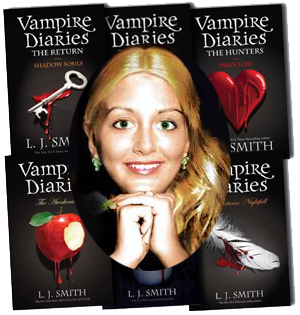
Below is an email that LJ Smith wrote to a fan:Thank you for your beautiful email. I completely understand why some fans get overeager—and especially if they think there is bad news for them. I hope that you will enjoy Midnight, as it is truly the story of Damon finding his deepest feelings for both Elena and Bonnie—and his feelings are definitely not platonic. In fact, to be blunt, without Bonnie and something that Bonnie does at the end, Damon would be permanently dead.
But right now I have to tell you something that makes me so sad and devastated—as bad, in fact, as I have ever felt except for when my mother died. It’s confidential, but it’s been so long now that I just can’t keep up a charade with good-hearted readers like you.To put it briefly, I’ve been fired from writing the Vampire Diaries. And I’ve been fighting and fighting this since last fall, but there is absolutely no recourse. Midnight is the last L. J. Smith book in the Vampire Diaries series.It probably sounds completely impossible to say that I am fired from writing my own books. But the truth is that they’re not mine, even though I write every word. When I was called by an agent and asked to write the vampire trilogy, that agent wasn’t from a publisher, but from what is now Alloy Entertainment, Ltd. And they are a book packager. A book packager sells books, already made with covers and all, to publishers, like HarperCollins—my publisher for The Vampire Diaries and The Secret Circle. And both these series were written “for hire” which means that the book packager owns the books the author produces. Although I didn’t even understand what “for hire” meant back in 1990, when I agreed to write books for them, I found out eventually, to my horror and dismay. It means that even though I have written the entire series, I don’t own anything about The Vampire Diaries. And from now on, the books will be written by an anonymous ghostwriter, just as Stefan’s Diaries are. It will say “Created by L. J. Smith” on the cover, but I am not allowed even to change a word in the ghostwriter’s book.You might wonder why the book packager and Harper would do this to me. I am not sure either, but usually a book packager gets very submissive, non-assertive writers to write for them—not to mention that most of them, writers or ghostwriters, have had a lot of publishers turn their books down. Book packagers are used to do a lot of editing on their author’s books—because the books need intense editing.But I’m not submissive, and I always fight editing. In Midnight, I had to fight to keep many Bonnie scenes in the book. I’m not at all sure they liked the things I was doing with Bonnie and Damon—they kept trying to cut such scenes. And of course they didn’t like Elena’s behavior at all. They want strictly Stelena books.So last fall when I gave them the book Phantom, they didn’t bother to give me edits. Instead, I was given a letter addressed to the ghostwriter by name, telling her to completely rewrite my book. They wouldn’t even listen when I pleaded and promised to do Phantom as they required. The simply took the series and gave it to the ghostwriter . . . to write not only The Hunters trilogy, but whatever comes after that.They have always tried to minimize my participation in The Vampire Diaries. On the very first original books in 1990 my name was almost invisible on the cover. And now they have my manuscript of Phantom, and the book the ghostwriter writes from it may even sound like I wrote it in places, because they have the right to use my work as they see fit. But the book after that … that will be pure ghostwriter. I would guess that they think you readers won’t see or care about the difference in writing styles and skills.I have said this to another Bamon fan, and I’ll say it now. I had so many plans for Bonnie in The Hunters trilogy.
First of all, in Phantom, I had her showing a lot more emotion, grieving right along side Elena because—well, because Damon does something almost unbelievable for Bonnie in Midnight and he doesn’t get out unscathed.
I won’t spoil it if you don’t know. But they wanted Bonnie to have just put it all behind her—and with Bonnie’s character, I don’t think so! She is always completely openhearted with her emotions; even though she has matured so much in Midnight, she’s still Bonnie, who says exactly what she thinks, even if she hasn’t had a dose of Black Magic wine.I wanted to write Moonsong, and give Bonnie an admirer who is just as sweet and even more naïve than she is—a pure white wolf with radiant blue eyes, who happens to be a werewolf with moonlight colored hair and the same blue eyes when he’s human. I wanted to show Damon’s surprising reaction to Xander the good werewolf (not at all happy about it—so much that he “accidentally” almost kills the poor innocent wolf) .I also wanted to show how Damon rescues Bonnie from a vicious wolf-pack attack, and then let her fly away with him. And I wanted to show how Bonnie, who knows a little medicine from her sister Mary, helps Damon deliver Caroline’s twin babies when she goes into labor deep in the woods. But that’s one scene that I would have had to fight tooth and nail for, because even the glow that Damon and Bonnie share at seeing new life come into the world wouldn’t be enough for them to call it decent. They would undoubtedly have tried to make me cut it. But I still want to write it, so badly.I even had the last book in that trilogy plotted out, where Stefan’s worst nightmare comes true and he takes so much blood from Elena that has to be taken to the hospital for a massive transfusion. He then decides to Influence Elena so hat she will forget his existence, and he does so, to Damon and Bonnie and Meredith’s consternation. I wanted to show how this affected each one of the characters, and how Bonnie once again begins to write in her diary, since Elena’s diary is also forgotten, along with Stefan. I like to write things from Bonnie’s point of view, as I did in Dark Reunion. But none of these things will happen, beause I won’t be around to write it. And I just can’t keep up the pretense any long with wonderful fans like you. I can’t pretend that Bonnie and Damon’s relationship will continue to grow as Damon learns to respect her as well as to love her. She has become “his girl” but I can’t follow up on that. I had to tell the ghostwriter that he would address Bonnie as “little redbird” when he speaks to her.Sorry for the long rant, but the charade is over for me. I don’t know how Phantom will turn out, with a blend of my manuscript and the complete rewriting of it by the ghostwriter. But I dread it, and even more do I dread what the next books will be like. I’ve worked so hard to make Vampire Diaries a good series, only to have the unthinkable happen to me. And I have no one but myself to blame for not being submissive enough.Lisa
L. J. SmithHowever all is not lost, J.L.. is now publishing her novels as fan fiction on Amazon’s Kindle Worlds.

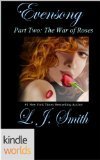

http://www.twluedke.com/
https://twitter.com/TWLuedke
http://www.facebook.com/TWLuedke
http://www.facebook.com/pages/TW-Lued...







http://nightstandnovels.com/author-l-j-smith-fired-writer-vampire-diaries-novels/
The author of VAMPIRE DIARIES has been fired and now is forced to write fan fiction of her own novels in order to continue the series SHE CREATED.
Author L.J. Smith Fired As Writer of HER Vampire Diaries Novels.Authors need to be very careful with whom and what they sign. I know people are eager to get signed with a publishing company or commissioned with some other fabulous entity but you have to be absolutely certain of what it is that you are signing. If one is unclear on any terms included in the contract, then seek a lawyer or someone else to help you understand. If there are any parts that you are not sure about or you feel does not suit you…be sure to negotiate their removal as well as anything that you would like included as well. This should never ever happen. An author should always own the rights to their work or in the event that they decide to sell it to someone, at least have the knowledge that it can’t be pawned off on to some ghost writer to do with as they please even if it means screwing it up.

Below is an email that LJ Smith wrote to a fan:Thank you for your beautiful email. I completely understand why some fans get overeager—and especially if they think there is bad news for them. I hope that you will enjoy Midnight, as it is truly the story of Damon finding his deepest feelings for both Elena and Bonnie—and his feelings are definitely not platonic. In fact, to be blunt, without Bonnie and something that Bonnie does at the end, Damon would be permanently dead.
But right now I have to tell you something that makes me so sad and devastated—as bad, in fact, as I have ever felt except for when my mother died. It’s confidential, but it’s been so long now that I just can’t keep up a charade with good-hearted readers like you.To put it briefly, I’ve been fired from writing the Vampire Diaries. And I’ve been fighting and fighting this since last fall, but there is absolutely no recourse. Midnight is the last L. J. Smith book in the Vampire Diaries series.It probably sounds completely impossible to say that I am fired from writing my own books. But the truth is that they’re not mine, even though I write every word. When I was called by an agent and asked to write the vampire trilogy, that agent wasn’t from a publisher, but from what is now Alloy Entertainment, Ltd. And they are a book packager. A book packager sells books, already made with covers and all, to publishers, like HarperCollins—my publisher for The Vampire Diaries and The Secret Circle. And both these series were written “for hire” which means that the book packager owns the books the author produces. Although I didn’t even understand what “for hire” meant back in 1990, when I agreed to write books for them, I found out eventually, to my horror and dismay. It means that even though I have written the entire series, I don’t own anything about The Vampire Diaries. And from now on, the books will be written by an anonymous ghostwriter, just as Stefan’s Diaries are. It will say “Created by L. J. Smith” on the cover, but I am not allowed even to change a word in the ghostwriter’s book.You might wonder why the book packager and Harper would do this to me. I am not sure either, but usually a book packager gets very submissive, non-assertive writers to write for them—not to mention that most of them, writers or ghostwriters, have had a lot of publishers turn their books down. Book packagers are used to do a lot of editing on their author’s books—because the books need intense editing.But I’m not submissive, and I always fight editing. In Midnight, I had to fight to keep many Bonnie scenes in the book. I’m not at all sure they liked the things I was doing with Bonnie and Damon—they kept trying to cut such scenes. And of course they didn’t like Elena’s behavior at all. They want strictly Stelena books.So last fall when I gave them the book Phantom, they didn’t bother to give me edits. Instead, I was given a letter addressed to the ghostwriter by name, telling her to completely rewrite my book. They wouldn’t even listen when I pleaded and promised to do Phantom as they required. The simply took the series and gave it to the ghostwriter . . . to write not only The Hunters trilogy, but whatever comes after that.They have always tried to minimize my participation in The Vampire Diaries. On the very first original books in 1990 my name was almost invisible on the cover. And now they have my manuscript of Phantom, and the book the ghostwriter writes from it may even sound like I wrote it in places, because they have the right to use my work as they see fit. But the book after that … that will be pure ghostwriter. I would guess that they think you readers won’t see or care about the difference in writing styles and skills.I have said this to another Bamon fan, and I’ll say it now. I had so many plans for Bonnie in The Hunters trilogy.
First of all, in Phantom, I had her showing a lot more emotion, grieving right along side Elena because—well, because Damon does something almost unbelievable for Bonnie in Midnight and he doesn’t get out unscathed.
I won’t spoil it if you don’t know. But they wanted Bonnie to have just put it all behind her—and with Bonnie’s character, I don’t think so! She is always completely openhearted with her emotions; even though she has matured so much in Midnight, she’s still Bonnie, who says exactly what she thinks, even if she hasn’t had a dose of Black Magic wine.I wanted to write Moonsong, and give Bonnie an admirer who is just as sweet and even more naïve than she is—a pure white wolf with radiant blue eyes, who happens to be a werewolf with moonlight colored hair and the same blue eyes when he’s human. I wanted to show Damon’s surprising reaction to Xander the good werewolf (not at all happy about it—so much that he “accidentally” almost kills the poor innocent wolf) .I also wanted to show how Damon rescues Bonnie from a vicious wolf-pack attack, and then let her fly away with him. And I wanted to show how Bonnie, who knows a little medicine from her sister Mary, helps Damon deliver Caroline’s twin babies when she goes into labor deep in the woods. But that’s one scene that I would have had to fight tooth and nail for, because even the glow that Damon and Bonnie share at seeing new life come into the world wouldn’t be enough for them to call it decent. They would undoubtedly have tried to make me cut it. But I still want to write it, so badly.I even had the last book in that trilogy plotted out, where Stefan’s worst nightmare comes true and he takes so much blood from Elena that has to be taken to the hospital for a massive transfusion. He then decides to Influence Elena so hat she will forget his existence, and he does so, to Damon and Bonnie and Meredith’s consternation. I wanted to show how this affected each one of the characters, and how Bonnie once again begins to write in her diary, since Elena’s diary is also forgotten, along with Stefan. I like to write things from Bonnie’s point of view, as I did in Dark Reunion. But none of these things will happen, beause I won’t be around to write it. And I just can’t keep up the pretense any long with wonderful fans like you. I can’t pretend that Bonnie and Damon’s relationship will continue to grow as Damon learns to respect her as well as to love her. She has become “his girl” but I can’t follow up on that. I had to tell the ghostwriter that he would address Bonnie as “little redbird” when he speaks to her.Sorry for the long rant, but the charade is over for me. I don’t know how Phantom will turn out, with a blend of my manuscript and the complete rewriting of it by the ghostwriter. But I dread it, and even more do I dread what the next books will be like. I’ve worked so hard to make Vampire Diaries a good series, only to have the unthinkable happen to me. And I have no one but myself to blame for not being submissive enough.Lisa
L. J. SmithHowever all is not lost, J.L.. is now publishing her novels as fan fiction on Amazon’s Kindle Worlds.




http://www.twluedke.com/
https://twitter.com/TWLuedke
http://www.facebook.com/TWLuedke
http://www.facebook.com/pages/TW-Lued...







Published on February 06, 2014 05:43
February 4, 2014
Come take a bite out of the Vampire #SocialMedia Hub #Vampires #UrbanFantasy #ASMSG

Vampire lovers everywhere UNITE at the VWSG Social Media Hub. And just what is VWSG? Its awesomesauce baddassary with real bite.
Vampires, bondage, biting ... what more do you need in life?
Yes, vampires suck, but they don't sparkle:
THE VAMPIRE WRITERS SUPPORT GROUP SOCIAL MEDIA HUB
No, its not like any other support group you have ever known, so don't even bother comparing it. Just show up and share in the sheer awesomeness.
http://www.twluedke.com/
https://twitter.com/TWLuedke
http://www.facebook.com/TWLuedke
http://www.facebook.com/pages/TW-Lued...







Published on February 04, 2014 08:33
January 31, 2014
Random vampire smuttery via Deviantart #Vampire #Smexy #ASMSG
 Have you guessed that I'm not wearing any underwear?
Have you guessed that I'm not wearing any underwear?Yep, its me again, surfing through deviantart for erotic vampire imagery. Maybe someday I will get my next novel written, but until then....
 Having a little too much fun playing with her food
Having a little too much fun playing with her food Is there something on my neck? I think I feel something on my neck
Is there something on my neck? I think I feel something on my neck She was a fine vintage, thirty-something, a bit fruity, but still dry on the palate
She was a fine vintage, thirty-something, a bit fruity, but still dry on the palateUntil we meet again, when I might actually have a chapter or something written, or more half-naked vampire images....
Travis
:)
http://www.twluedke.com/
https://twitter.com/TWLuedke
http://www.facebook.com/TWLuedke
http://www.facebook.com/pages/TW-Lued...







Published on January 31, 2014 16:26
January 28, 2014
Like Young Adult novels? Check out the #YA #SocialMedia HUB (FREEBIES-Promos-Excerpts) #ASMSG

If you enjoy Young Adult novels of all types, paranormal, fantasy, romance, thriller, you must see the NEW ASMSG Young Adult Social Media Hub!
https://www.rebelmouse.com/ASMSGHub5/
The Hub has blog posts, excerpts, reviews, FREEBIES, Kindle Countdowns, and all the cool YA stuff you can handle!
http://www.twluedke.com/
https://twitter.com/TWLuedke
http://www.facebook.com/TWLuedke
http://www.facebook.com/pages/TW-Lued...







Published on January 28, 2014 09:33
January 26, 2014
Smoking HOT #Erotica and #Romance ~ #ASMSG #SocialMediaMadness (Freebies and Kindle Countdowns)

Come on down to the ole HUB, and see what kind of steamy debauchery and sappy romance you can find. Blog posts, articles, excerpts, free books, Kindle Countdowns, find it all at the HUB:
ASMSG Rom/Erotic Romance Social Media Hub
https://www.rebelmouse.com/ASMSGHub4/
http://www.twluedke.com/
https://twitter.com/TWLuedke
http://www.facebook.com/TWLuedke
http://www.facebook.com/pages/TW-Lued...







Published on January 26, 2014 09:37
January 23, 2014
Deviantart Inspirational Imagery! #Vampire #Erotica #ASMSG
 Who wants to go swimming with me?I was cruising through Deviantart last night, looking for something, I don't even recall what, and I happened upon a series of artists I had never seen before, specifically vampire artists.
Who wants to go swimming with me?I was cruising through Deviantart last night, looking for something, I don't even recall what, and I happened upon a series of artists I had never seen before, specifically vampire artists.It was an orgy of vampiric imagery, the likes of which Bram Stoker never imagined in his wildest dreams of vampire debauchery. I just had to share them on my blog. And, there's absolutely no way I can hold back from a twitter flurry of VAMPIRE SEXUAL FRENZY.
 Just shut up and bite me already
Just shut up and bite me already The things I would pay her to do with that tongue....
The things I would pay her to do with that tongue.... You invited her over for dinner, but she's staying for desert,
You invited her over for dinner, but she's staying for desert,whether you want her or not...
 I'll take that two for one deal all night long....
I'll take that two for one deal all night long....
 And lets finish this off with a little vampire menage...the more the merrier!
And lets finish this off with a little vampire menage...the more the merrier!If you'd like to check out where these came from, start surfing deviantart. I began with the search terms 'Sexy Vampire' and that blew about three hours of my evening.
http://www.deviantart.com/art/Lilith-IX-291936743
Until next time, or another installment of vampire orgy-fest.
Travis
:)
http://www.twluedke.com/
https://twitter.com/TWLuedke
http://www.facebook.com/TWLuedke
http://www.facebook.com/pages/TW-Lued...







Published on January 23, 2014 06:12
January 20, 2014
Help design a SEX TOY & Win Patricia Knight's new novel! #NSFW #ASMSG
~~Design a SEX TOY Contest via PATRICIA A. KNIGHT!~~Design a futuristic sex toy Patricia can use in her new release, Hers To Claim and get your name in the acknowledgments!(It's okay if you want to use an alias...LOL)~~~
Here's the deal:
The hero in my current WIP (work in progress) is a sexual dominant. One of his favorite past-times is erotically teasing the sexually repressed heroine.
One of his favorite past-times is erotically teasing the sexually repressed heroine. But what would the sex toys look like in a future world on a primitive planet lacking AA and AAA batteries...or electricity?
But what would the sex toys look like in a future world on a primitive planet lacking AA and AAA batteries...or electricity?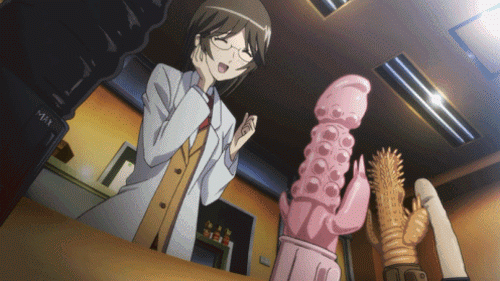 MMM...probably not.
MMM...probably not.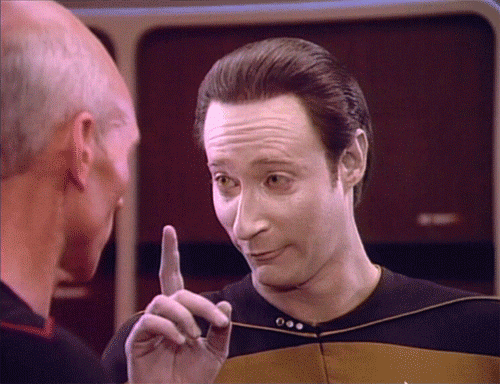 So...what sort of toys might he use to keep the object of his attention quivering on the tips of her toes?
So...what sort of toys might he use to keep the object of his attention quivering on the tips of her toes? To Boldly Go Where No Man Has Gone Before! (cue the music).
To Boldly Go Where No Man Has Gone Before! (cue the music).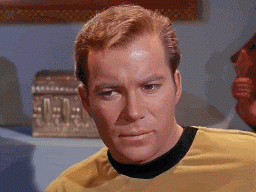 Allow your imagination to run amuck. What shapes and colors would they take? What strange lifeforms could be adapted? Like quivering, pulsing oystery things or darty little nano-botts.
Allow your imagination to run amuck. What shapes and colors would they take? What strange lifeforms could be adapted? Like quivering, pulsing oystery things or darty little nano-botts. Indulge in kinky visions of the impossible future that would
Indulge in kinky visions of the impossible future that would
make a Vulcan faint...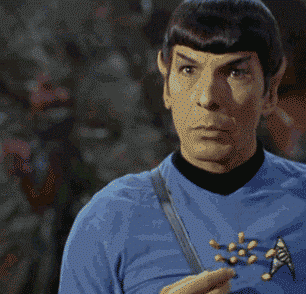 Or a Klingon shudder...
Or a Klingon shudder...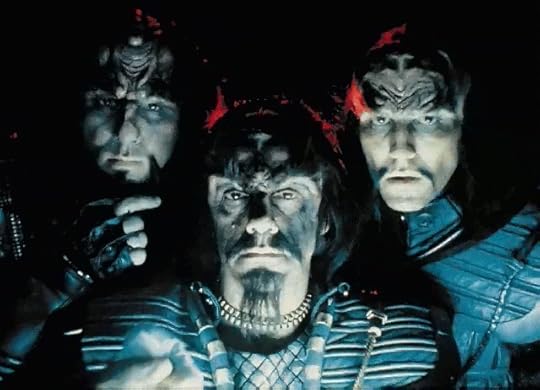
Then SHARE!
 If I use your "toy" in my book, you get credits in the acknowledgment (yes, if you want I'll use an alias :) AND
If I use your "toy" in my book, you get credits in the acknowledgment (yes, if you want I'll use an alias :) AND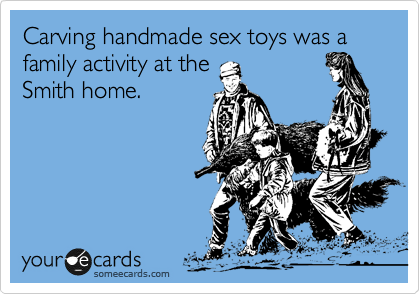 and a signed copy of my book:
and a signed copy of my book: NO!!! not THAT bookTHIS BOOK!
NO!!! not THAT bookTHIS BOOK! Send your emails with descriptions and pictures to patriciaknight190@gmail.com.Contest ends when the edits begin -- mid-March. The winner will be posted on my website.Have fun!Patricia
Send your emails with descriptions and pictures to patriciaknight190@gmail.com.Contest ends when the edits begin -- mid-March. The winner will be posted on my website.Have fun!Patricia
 Share
Share
 Tweet
Tweet
 Forward to Friend
Forward to Friend
 +1http://www.twluedke.com/
+1http://www.twluedke.com/
https://twitter.com/TWLuedke
http://www.facebook.com/TWLuedke
http://www.facebook.com/pages/TW-Lued...







Here's the deal:
The hero in my current WIP (work in progress) is a sexual dominant.
 One of his favorite past-times is erotically teasing the sexually repressed heroine.
One of his favorite past-times is erotically teasing the sexually repressed heroine. But what would the sex toys look like in a future world on a primitive planet lacking AA and AAA batteries...or electricity?
But what would the sex toys look like in a future world on a primitive planet lacking AA and AAA batteries...or electricity? MMM...probably not.
MMM...probably not. So...what sort of toys might he use to keep the object of his attention quivering on the tips of her toes?
So...what sort of toys might he use to keep the object of his attention quivering on the tips of her toes? To Boldly Go Where No Man Has Gone Before! (cue the music).
To Boldly Go Where No Man Has Gone Before! (cue the music). Allow your imagination to run amuck. What shapes and colors would they take? What strange lifeforms could be adapted? Like quivering, pulsing oystery things or darty little nano-botts.
Allow your imagination to run amuck. What shapes and colors would they take? What strange lifeforms could be adapted? Like quivering, pulsing oystery things or darty little nano-botts. Indulge in kinky visions of the impossible future that would
Indulge in kinky visions of the impossible future that wouldmake a Vulcan faint...
 Or a Klingon shudder...
Or a Klingon shudder...
Then SHARE!
 If I use your "toy" in my book, you get credits in the acknowledgment (yes, if you want I'll use an alias :) AND
If I use your "toy" in my book, you get credits in the acknowledgment (yes, if you want I'll use an alias :) AND and a signed copy of my book:
and a signed copy of my book: NO!!! not THAT bookTHIS BOOK!
NO!!! not THAT bookTHIS BOOK! Send your emails with descriptions and pictures to patriciaknight190@gmail.com.Contest ends when the edits begin -- mid-March. The winner will be posted on my website.Have fun!Patricia
Send your emails with descriptions and pictures to patriciaknight190@gmail.com.Contest ends when the edits begin -- mid-March. The winner will be posted on my website.Have fun!Patricia
 Share
Share
 Tweet
Tweet
 Forward to Friend
Forward to Friend
 +1http://www.twluedke.com/
+1http://www.twluedke.com/https://twitter.com/TWLuedke
http://www.facebook.com/TWLuedke
http://www.facebook.com/pages/TW-Lued...







Published on January 20, 2014 09:43



